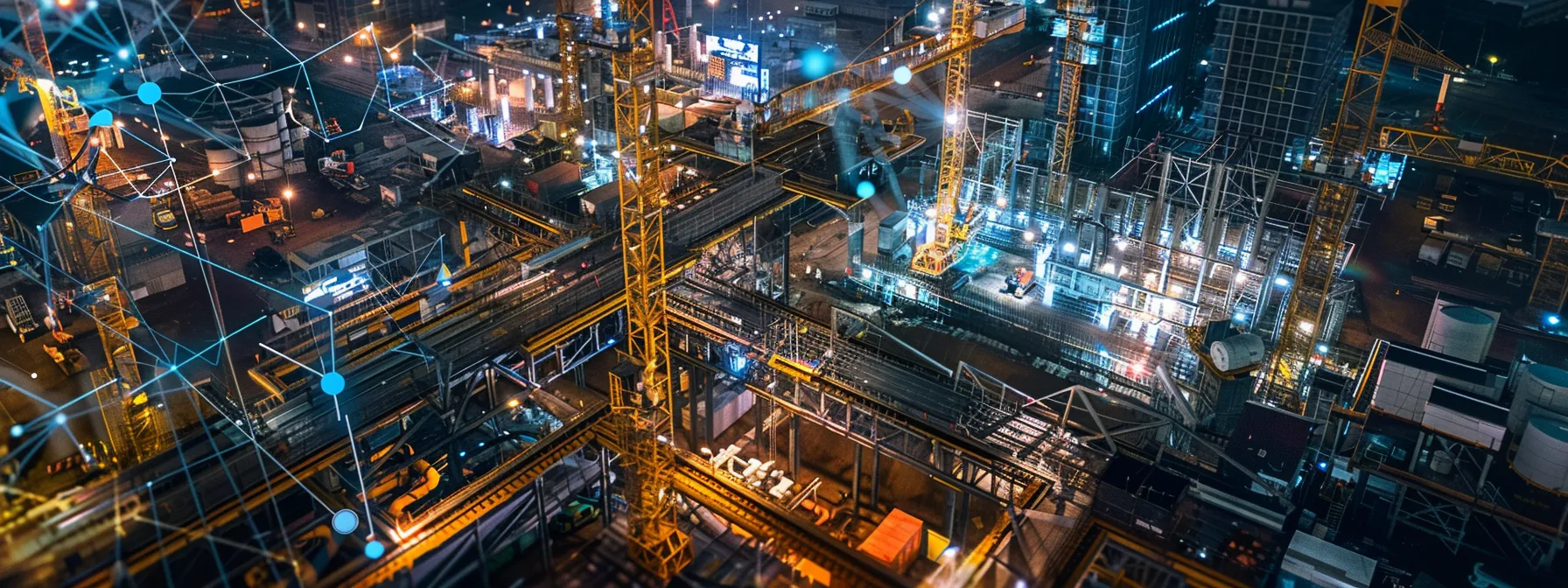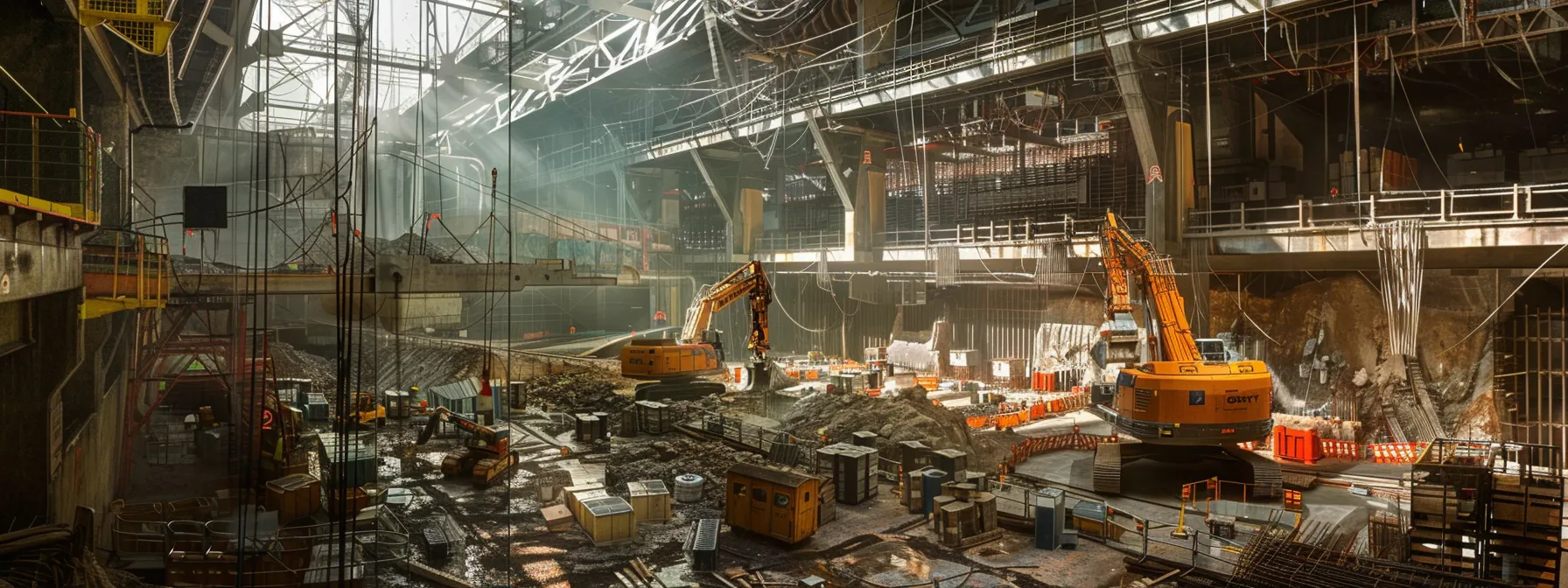Transforming Infrastructure Development With Artificial Intelligence

How is artificial intelligence revolutionizing infrastructure development? AI technologies are transforming the planning, design, and management of infrastructure projects. This article explores the impact of AI on infrastructure development, highlighting key applications and benefits. We’ll discuss how AI enhances decision-making, improves efficiency, and reduces costs in infrastructure projects. By understanding AI’s role in infrastructure, readers will gain insights into the future of smart cities and sustainable development.
Table of Contents
- 1 Key Takeaways
- 2 Introduction to AI in Infrastructure Planning
- 3 The Impact of AI on Infrastructure Development
- 4 Key Applications of AI in Infrastructure Projects
- 5 Benefits of Adopting AI in Infrastructure Development
- 6 Challenges in Implementing AI Technologies
- 7 Future Trends in AI and Infrastructure Planning
- 8 Conclusion
Key Takeaways
- AI revolutionizes infrastructure planning through advanced data analysis and decision-making technologies
- AI-driven automation optimizes project execution, reducing costs and improving efficiency in infrastructure development
- Integrating AI with IoT enables real-time data collection and analysis for better infrastructure management
- Organizations must address data privacy, security concerns, and skill gaps when implementing AI in infrastructure projects
- Future trends include quantum computing, edge AI, and advanced automation in construction for smarter infrastructure development
Introduction to AI in Infrastructure Planning

Artificial Intelligence is revolutionizing infrastructure planning, transforming traditional methods through advanced data collection and analysis. AI technologies, including large language models and AWS services, are streamlining decision-making processes and reducing latency in project execution. This evolution in planning techniques is attracting significant investment, promising more efficient and sustainable infrastructure development.
Understanding Artificial Intelligence in the Context of Infrastructure
Artificial Intelligence in infrastructure planning encompasses a range of technologies that enhance decision-making processes and optimize resource allocation. Computer vision systems analyze visual data for infrastructure assessment, while AI-driven sustainability models help planners create environmentally friendly designs. These technologies integrate with policy frameworks to ensure compliance and efficiency, revolutionizing how infrastructure projects are conceptualized and executed.
The Evolution of Infrastructure Planning Methods
The evolution of infrastructure planning methods has been significantly accelerated by the integration of advanced technologies. High-performance computing (HPC) and sophisticated algorithms now enable planners to process vast amounts of data, optimizing electricity distribution and resource allocation. Tech giants like IBM and Google Cloud Platform have introduced AI-powered solutions that revolutionize the planning process, allowing for more accurate predictions and efficient decision-making in infrastructure development:
- HPC systems analyze complex urban data
- AI algorithms optimize electricity grid planning
- IBM’s cognitive solutions enhance infrastructure management
- Google Cloud Platform provides scalable infrastructure modeling tools
Transforming Traditional Planning With AI Technologies
AI technologies are transforming traditional infrastructure planning by integrating advanced analytics and language models into the planning process. These tools enhance productivity by automating data analysis and decision-making, allowing planners to focus on strategic aspects of infrastructure development. Open-source AI architectures provide accessible platforms for innovation, enabling smaller organizations to leverage cutting-edge technology in their planning processes.
The Impact of AI on Infrastructure Development

AI is transforming infrastructure development through enhanced decision-making, increased efficiency, and cost reduction. Companies leverage machine learning and data analytics to improve capacity planning and research. AI-driven automation optimizes project execution, while advanced analytics streamline decision processes, revolutionizing how infrastructure projects are conceived and implemented.
Enhancing Decision-Making Processes With Data Analytics
Data analytics enhances decision-making processes in infrastructure development by leveraging AI accelerators and advanced DevOps tools. These systems analyze vast amounts of data to identify patterns, predict risks, and optimize resource allocation. By integrating AI-powered analytics tools into their workflow, infrastructure planners can make more informed decisions, reducing project risks and improving overall efficiency.
Increasing Efficiency in Project Planning and Execution
AI technologies significantly enhance efficiency in project planning and execution for infrastructure development. Foundation models, powered by advanced computers and cloud platforms, enable predictive maintenance and streamline project workflows. These systems integrate seamlessly into existing infrastructure ecosystems, allowing for real-time adjustments and optimized resource allocation throughout the project lifecycle.
Reducing Costs Through Automation and Optimization
AI-driven automation and optimization significantly reduce costs in infrastructure development. Cloud-based distributed computing systems and tensor processing units enhance data processing efficiency, enabling faster and more accurate decision-making. These technologies streamline resource allocation, minimize waste, and improve overall project efficiency, resulting in substantial cost savings for infrastructure projects.
Key Applications of AI in Infrastructure Projects

AI applications in infrastructure projects span predictive analytics, design tools, resource allocation, safety monitoring, and IoT integration. These technologies leverage Apache Spark for data processing and machine learning workflows, enhancing scalability and efficiency. From demand forecasting to smart infrastructure implementation, AI transforms project planning and execution, optimizing data storage and analysis for improved decision-making.
Utilizing Predictive Analytics for Demand Forecasting
Predictive analytics leverages unsupervised learning algorithms and advanced server technology to forecast infrastructure demand accurately. Intel’s powerful processors enable complex data analysis, processing vast amounts of information to identify patterns and trends. This approach allows planners to anticipate future needs, optimizing resource allocation and preventing overbuilding or underutilization of infrastructure systems. By incorporating language processing capabilities, these predictive models can also interpret qualitative data, providing a more comprehensive understanding of future infrastructure requirements.
Implementing AI-Powered Design and Modeling Tools
AI-powered design and modeling tools revolutionize infrastructure development by integrating data security measures and automation processes. These advanced systems utilize virtualization technology to create accurate digital twins of transport networks, enabling planners to simulate and optimize infrastructure designs before implementation. Chatbots equipped with natural language processing capabilities assist in data interpretation and decision-making, streamlining the design process and enhancing collaboration among project stakeholders.
Optimizing Resource Allocation With Machine Learning
Machine learning algorithms optimize resource allocation in infrastructure projects by analyzing vast datasets to predict resource needs and streamline distribution. Azure’s cloud-based services enable efficient processing of building and IT infrastructure data, allowing for real-time adjustments to bandwidth and resource allocation. This approach enhances project efficiency, reduces waste, and improves overall cost-effectiveness in infrastructure development.
Enhancing Safety Measures Through AI Monitoring
AI monitoring systems enhance safety measures in infrastructure projects by utilizing TensorFlow and advanced data center infrastructure to process real-time data from sensors and cameras. These systems analyze the landscape of construction sites, detecting potential hazards and alerting workers to dangerous conditions. By leveraging tensor operations and internet connectivity, AI monitoring platforms can process vast amounts of information quickly, enabling rapid response to safety concerns and preventing accidents before they occur:
- Real-time hazard detection using TensorFlow models
- Continuous monitoring of construction site landscape
- Rapid alert systems powered by data center infrastructure
- Predictive maintenance scheduling to prevent equipment failures
- Integration with wearable devices for personalized worker safety
Integrating Smart Infrastructure With Internet of Things (IoT)
Integrating smart infrastructure with the Internet of Things (IoT) revolutionizes infrastructure development through generative artificial intelligence and machine learning operations. Organizations leverage Amazon Web Services to connect vast networks of sensors, enabling real-time data collection and analysis for improved prediction and decision-making. This integration enhances infrastructure management, optimizing resource allocation and maintenance schedules while providing valuable insights for future development projects.
Benefits of Adopting AI in Infrastructure Development

Adopting AI in infrastructure development offers numerous benefits, including enhanced productivity and performance outcomes. Robotics and information technology, coupled with natural language processing and software like PyTorch, enable sustainable practices and real-time monitoring. These advancements improve collaboration among stakeholders, transforming project management and execution in the infrastructure sector.
Boosting Productivity and Performance Outcomes
AI adoption in infrastructure development significantly boosts productivity and performance outcomes through advanced knowledge management and cloud computing capabilities. Deep learning algorithms, powered by supercomputers, process vast amounts of data to optimize project planning and execution. These systems operate within regulatory frameworks, ensuring compliance while enhancing efficiency and decision-making processes across infrastructure projects.
Promoting Sustainable and Eco-Friendly Practices
AI-driven infrastructure development promotes sustainable and eco-friendly practices by optimizing maintenance schedules and reducing carbon emissions. Advanced data management systems and computing platforms analyze real-time information from data centers to identify energy-efficient solutions. These technologies enable infrastructure planners to implement sustainable designs, minimize resource waste, and improve overall environmental performance in construction and operation phases.
Enabling Real-Time Monitoring and Maintenance
AI-powered real-time monitoring and maintenance systems revolutionize infrastructure development by enabling continuous data collection and analysis. These systems leverage Microsoft Azure’s cloud computing capabilities to process vast amounts of information from sensors and databases, allowing for immediate detection of issues and proactive maintenance scheduling. Through collaborative platforms, infrastructure managers can experiment with different maintenance strategies, optimizing resource allocation and minimizing downtime across development projects.
Improving Collaboration Among Project Stakeholders
AI-powered collaboration tools enhance communication and coordination among project stakeholders in infrastructure development. These systems integrate resource planning, engineering data, and safety protocols into centralized platforms, allowing real-time information sharing and decision-making. By leveraging cloud storage and advanced analytics, stakeholders can access critical project data, track progress, and address issues promptly, leading to more efficient planning and execution of infrastructure projects:
- Centralized data repositories for improved information accessibility
- Real-time collaboration platforms for engineers and project managers
- Automated safety compliance tracking and reporting
- AI-driven resource allocation and scheduling tools
- Virtual reality simulations for stakeholder engagement and project visualization
Challenges in Implementing AI Technologies

Implementing artificial intelligence in infrastructure development presents significant challenges. Data privacy, security concerns, and technical skill gaps require attention. Organizations must navigate regulatory and ethical considerations while integrating AI systems with existing infrastructure. Addressing these issues is crucial for leveraging AI’s competitive advantage and realizing its full potential in transforming infrastructure projects.
Addressing Data Privacy and Security Concerns
Addressing data privacy and security concerns in AI-driven infrastructure development requires robust design and simulation protocols. Organizations must implement a comprehensive security stack to protect sensitive data throughout the project lifecycle. This approach often increases initial costs but proves cost-effective in the long run by preventing data breaches and ensuring compliance with privacy regulations. Infrastructure developers must carefully balance their security budget with other project expenses, prioritizing data protection without compromising overall project efficiency.
Overcoming Technical Skill Gaps and Workforce Training
Overcoming technical skill gaps and workforce training presents a significant challenge in implementing artificial intelligence for infrastructure development. Organizations must invest in comprehensive training programs that cover essential skills such as linux administration, version control systems, and computer hardware fundamentals. Innovation in AI technologies outpaces traditional educational curricula, requiring continuous learning and adaptation from the workforce. To address this challenge, infrastructure developers are implementing mentorship programs and partnering with educational institutions to create tailored training modules that align with the rapidly evolving AI landscape:
Navigating regulatory and ethical considerations poses significant challenges for organizations implementing AI in infrastructure development. As predictive analytics and data solutions become integral to project planning, developers must ensure compliance with evolving regulations while addressing ethical concerns surrounding AI adoption. The implementation of AIOps requires careful consideration of data privacy, algorithmic bias, and transparency, necessitating the development of robust governance frameworks that balance innovation with responsible AI use in infrastructure projects.
Integrating AI Systems With Existing Infrastructure
Integrating AI systems with existing infrastructure presents significant challenges for organizations seeking to leverage machine learning in their development projects. Legacy assets often lack the necessary sensors and data collection capabilities to fully utilize AI technologies, requiring substantial investments in modernization. Infrastructure managers must carefully evaluate the return on investment for AI integration, balancing the costs of upgrading existing systems with the potential benefits of enhanced efficiency and predictive maintenance. This process demands a strategic approach to implementation, ensuring seamless integration of AI solutions without disrupting ongoing operations or compromising the integrity of established infrastructure networks.
Future Trends in AI and Infrastructure Planning

Future trends in AI and infrastructure planning encompass emerging technologies, smart city development, advanced construction automation, and ongoing innovations. Infrastructurist explores how data-driven approaches and inference capabilities are shaping these trends, while ensuring regulatory compliance. The following sections delve into specific aspects of AI’s role in transforming infrastructure development.
Exploring Emerging Technologies Impacting Development
Emerging technologies are reshaping infrastructure development, with quantum computing and edge AI leading the charge. Quantum algorithms enable complex simulations for optimized urban planning, while edge AI enhances real-time decision-making in smart infrastructure systems. These advancements are driving more efficient resource allocation and improved sustainability in infrastructure projects, paving the way for innovative solutions to longstanding urban challenges.
The Role of AI in Developing Smart Cities
AI plays a pivotal role in developing smart cities by integrating advanced data analytics and machine learning algorithms into urban infrastructure systems. These technologies enable real-time monitoring and optimization of city services, from traffic management to energy distribution. By leveraging AI-driven predictive models, city planners can anticipate future needs and allocate resources more efficiently, leading to improved quality of life for residents and more sustainable urban environments.
Preparing for Advanced Automation in Construction
Advanced automation in construction is poised to revolutionize infrastructure development. AI-driven robotics and autonomous machinery will streamline construction processes, reducing human error and increasing efficiency. Construction firms must invest in training programs to prepare their workforce for this technological shift, focusing on skills like robotic operation and data analysis. As automation becomes more prevalent, the industry will see a transformation in job roles, with a greater emphasis on technical oversight and system management:
- Implementation of AI-powered construction robots
- Development of autonomous heavy machinery
- Creation of specialized training programs for automation
- Shift in job roles towards technical oversight
- Integration of AI systems for project management and quality control
Strategies for Embracing Ongoing AI Innovations
Infrastructure developers must adopt agile strategies to embrace ongoing AI innovations. Organizations should establish dedicated innovation teams to monitor emerging AI technologies and assess their potential impact on infrastructure projects. Regular tech audits and partnerships with AI research institutions can help companies stay ahead of the curve, ensuring they leverage the most advanced AI solutions for improved infrastructure planning and execution.
Conclusion
Artificial Intelligence is revolutionizing infrastructure development by enhancing decision-making processes, increasing efficiency, and reducing costs through advanced data analytics and automation. From predictive analytics for demand forecasting to AI-powered design tools and smart infrastructure integration, AI applications are transforming every aspect of infrastructure planning and execution. Despite challenges such as data privacy concerns and technical skill gaps, the benefits of adopting AI in infrastructure development are significant, including improved productivity, sustainable practices, and enhanced collaboration among stakeholders. As emerging technologies continue to shape the future of infrastructure planning, embracing AI innovations will be crucial for developing smart cities, advancing construction automation, and creating more efficient, sustainable urban environments.






